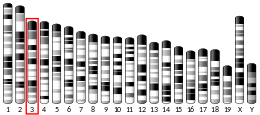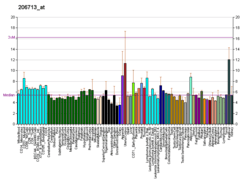Netrin G1
Netrin-G1 is a protein that in humans is encoded by the NTNG1 gene.[5][6]
Netrin G1 (NTNG1) belongs to a conserved family of proteins that act as axon guidance cues during vertebrate nervous system development (Nakashiba et al., 2000).[supplied by OMIM][6]
References
- 1 2 3 GRCh38: Ensembl release 89: ENSG00000162631 - Ensembl, May 2017
- 1 2 3 GRCm38: Ensembl release 89: ENSMUSG00000059857 - Ensembl, May 2017
- ↑ "Human PubMed Reference:".
- ↑ "Mouse PubMed Reference:".
- ↑ Nakashiba T, Ikeda T, Nishimura S, Tashiro K, Honjo T, Culotti JG, Itohara S (Sep 2000). "Netrin-G1: a novel glycosyl phosphatidylinositol-linked mammalian netrin that is functionally divergent from classical netrins". J Neurosci. 20 (17): 6540–50. PMID 10964959.
- 1 2 "Entrez Gene: NTNG1 netrin G1".
Further reading
- Nagase T, Ishikawa K, Suyama M, et al. (1999). "Prediction of the coding sequences of unidentified human genes. XIII. The complete sequences of 100 new cDNA clones from brain which code for large proteins in vitro". DNA Res. 6 (1): 63–70. PMID 10231032. doi:10.1093/dnares/6.1.63.
- Strausberg RL, Feingold EA, Grouse LH, et al. (2003). "Generation and initial analysis of more than 15,000 full-length human and mouse cDNA sequences". Proc. Natl. Acad. Sci. U.S.A. 99 (26): 16899–903. PMC 139241
 . PMID 12477932. doi:10.1073/pnas.242603899.
. PMID 12477932. doi:10.1073/pnas.242603899. - Clark HF, Gurney AL, Abaya E, et al. (2003). "The Secreted Protein Discovery Initiative (SPDI), a Large-Scale Effort to Identify Novel Human Secreted and Transmembrane Proteins: A Bioinformatics Assessment". Genome Res. 13 (10): 2265–70. PMC 403697
 . PMID 12975309. doi:10.1101/gr.1293003.
. PMID 12975309. doi:10.1101/gr.1293003. - Lin JC, Ho WH, Gurney A, Rosenthal A (2004). "The netrin-G1 ligand NGL-1 promotes the outgrowth of thalamocortical axons". Nat. Neurosci. 6 (12): 1270–6. PMID 14595443. doi:10.1038/nn1148.
- Zhang Z, Henzel WJ (2005). "Signal peptide prediction based on analysis of experimentally verified cleavage sites". Protein Sci. 13 (10): 2819–24. PMC 2286551
 . PMID 15340161. doi:10.1110/ps.04682504.
. PMID 15340161. doi:10.1110/ps.04682504. - Gerhard DS, Wagner L, Feingold EA, et al. (2004). "The Status, Quality, and Expansion of the NIH Full-Length cDNA Project: The Mammalian Gene Collection (MGC)". Genome Res. 14 (10B): 2121–7. PMC 528928
 . PMID 15489334. doi:10.1101/gr.2596504.
. PMID 15489334. doi:10.1101/gr.2596504. - Fukasawa M, Aoki M, Yamada K, et al. (2004). "Case-control association study of human netrin G1 gene in Japanese schizophrenia". J. Med. Dent. Sci. 51 (2): 121–8. PMID 15508520.
- Aoki-Suzuki M, Yamada K, Meerabux J, et al. (2005). "A family-based association study and gene expression analyses of netrin-G1 and -G2 genes in schizophrenia". Biol. Psychiatry. 57 (4): 382–93. PMID 15705354. doi:10.1016/j.biopsych.2004.11.022.
- Borg I, Freude K, Kübart S, et al. (2005). "Disruption of Netrin G1 by a balanced chromosome translocation in a girl with Rett syndrome". European Journal of Human Genetics. 13 (8): 921–7. PMID 15870826. doi:10.1038/sj.ejhg.5201429.
- Meerabux JM, Ohba H, Fukasawa M, et al. (2006). "Human netrin-G1 isoforms show evidence of differential expression". Genomics. 86 (1): 112–6. PMID 15901489. doi:10.1016/j.ygeno.2005.04.004.
- Archer HL, Evans JC, Millar DS, et al. (2006). "NTNG1 Mutations are a Rare Cause of Rett Syndrome". American Journal of Medical Genetics. 140 (7): 691–4. PMC 2577736
 . PMID 16502428. doi:10.1002/ajmg.a.31133.
. PMID 16502428. doi:10.1002/ajmg.a.31133. - Gregory SG, Barlow KF, McLay KE, et al. (2006). "The DNA sequence and biological annotation of human chromosome 1". Nature. 441 (7091): 315–21. PMID 16710414. doi:10.1038/nature04727.
- Nectoux J, Girard B, Bahi-Buisson N, et al. (2007). "Netrin G1 mutations are an uncommon cause of atypical Rett syndrome with or without epilepsy". Pediatr. Neurol. 37 (4): 270–4. PMID 17903671. doi:10.1016/j.pediatrneurol.2007.06.002.
This article is issued from
Wikipedia.
The text is licensed under Creative Commons - Attribution - Sharealike.
Additional terms may apply for the media files.




